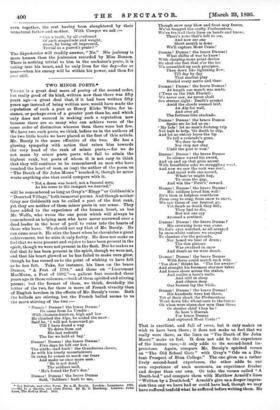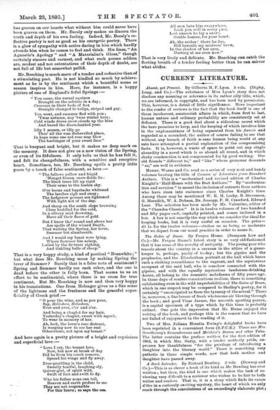TWO MINOR POETS.*
THERE is a great deal more of poetry of the second order, but really good of its kind, written now than there was fifty
years ago—a great deal that, if it had been written fifty years ago instead of being written now, would have made the reputation of such a poet as Henry Kirke White, for in- stance, or perhaps even of a greater poet than he, and which only does not succeed in making such a reputation now because there are so many who can achieve verse of the same order of distinction whereas then there were but few. We have two such poets, we think, before us in the authors of the two little books we have placed at the foot of this article.
Mr. Beesly is the more effective of the two. He has a glowing sympathy with action that raises him towards the very head of the rank of minor poets,—for we do not mean by minor poets poets who fail to attain the highest rank, but poets of whom it is not easy to think that they will continue to be remembered as men who have touched the heart of man, as (say) the author of the poem on "The Death of Sir John Moore" touched it, though he never wrote anything else that could compare with it.
"Not a drum was heard, not a funeral note, As his corse to the rampart we hurried," will be remembered as long as Gray's "Elegy" or Goldsmith's "Deserted Village," both immortal poems. And though neither Gray nor Goldsmith can be called a poet of the first rank, yet they are neither of them minor poets in our sense. They have added to the experience of the human heart, as has Mr. Wolfe, who wrote the one poem which will always be remembered as helping men who have never sorrowed over a dead leader in the hour of peril to enter into the hearts of those who have. We should not say that of Mr. Beesly. He can come near it. He stirs the heart when he chronicles a great achievement, but he stirs it only feebly. He does not make us feel that we were present and rejoice to have been present in the spirit, though we were not present in the flesh. But he makes us feel that he has been present in the spirit, though we were not, and that his heart glowed as he has failed to make oars glow, though he has roused us to the point of wishing to have felt as he has felt. Take, for instance, his lines on the brave Dumas, "A Feat of 1794," and those on "Lieutenant MacMunn, a Feat of 1892,"—a gallant feat recorded three years ago in these columns,—both of them spirited and stirring poems ; but the former of them, we think, decidedly the better of the two, for there is more of French vivacity than of English heroism in the effects of Mr. Beesly's verse. Both the ballads are stirring, but the French ballad seems to us the more stirring of the two :—
" Dumas ! Dumas ! the brave Dumas !
He came from La Vendee: With chamois-hunters, high and low He climbed the Alps, he scaled the snow :
Said be, I will not homeward go
Till I have found a way To drive from out His last redoubt The foe we hold at bay.'
Dumas! Dumas ! the brave Dumas !
Five days he left our ken : The sixth—and hark ! the thunderous cheers, As with his trusty mountaineers In camp he comes to mock our fears And make us once more men : 'He is not dead,' The soldiers said,
He's found the fox's den.'
Dumas! Dumas ! the brave Dumas Said, Soldiers ! bark to me,
• (1.) Ballad,, and other Verse. By A. H. Beeely. London: Longman& 1895. --(2.) In a Garden, and other Poems, By H. C. Bowling. London: John Lan& The Bodley Head. 1895.
Though snow may blow and frost may freeze, We've trapped the crafty Piedmontese, We've trackel their lines on hands and knee3, There's none that's left to see, And now ere one Short month is done We'll capture Mont Cenis.'
Dumas ! Dumas ! the brave Dumas What shifts of war he knew ! With clasping-irons point device He shod our feet that o'er the ice We scrambled up each precipice, Then down like lightning flew,
Till day by day
That martial play Steeled every nerve and thew.
Dumas! Dumas ! the brave Dumas !
At length our march was made, ('Twas on the 19th Floreal) : We never saw, we never shall See sterner sight : Death's arsenal
Amid the clouds seemed laid, An Alp for wall, And over all The fortress-like stockade.
Dumas ! Dumas! the brave Dumas Spake ere he led us on : 'My lads ! let no man's footstep trip Nor halt to help, 'tis death to slip, And let no oatery leave the lip To tell a comrade's gone, We dare to-day Nor stop nor stay Until the post is won.'
Dumas ! Dumas ! the brave Dumas In silence waved his sword, And up and up that grim ascent With breathless sobs we struggling wo;:t.
And now we saw the rock was rent, And raced with one accord, Whate'er might hap, To cross the gap, And win the First's' reward.
Dumas ! Dumas! the brave Dumas!
His soldiers loved him well ! Ev'n then in helpless overthrow From crag to crag, from snow to snow, We saw three of our bravest go.
Yet dumb as death they fell; They had to die, But not one cry Aroused a sentinel.
Dumas! Dumas ! the brave Dumas !
His crowning hour was come. No foe's eyes watched, as all arrayed In snow-white vesture we essayed To clamber o'er the palisade, Nor heard we beat of drum ; The dim plateau Was swathed in snow And dumb as we were dumb.
Dumas! Dumas ! the brave Dumas With force could match each wile. 'Too slow,' thinks he. The foe awakes.' And straight his foremost stormer takes And tosses sheer across the stakes, And smiles a hero's smile.
And still in sleep And silence deep Our foemen lay the while.
Dumas ! Dumas ! the brave Dumas !
His hundreds were but three, Yet at their shock the Piedmontese Went down like wheat-ears to the breeze Oh when were stauncher men than these, Or stouter chief than he ?
So here 's Hurrah For brave Dumas And captured Mont Cenis !"
That is excellent, and full of verve, but it only makes us wish to have been there ; it does not make us feel that we really were there, as the lines on "The Death of Sir John Moore" make us feel. It does not add to the experience of the human race,—it only adds to its second-hand im- pressions. Again, compare Mr. Beesly's spirited verses on "The Old School Gate" with Gray's "Ode on a Dis- tant Prospect of Eton College." The one gives us a rather lively second-hand experience, the other adds to our own experience of such moments, an experience fresher and deeper than oar own. Or take the verses called "A Death-bed" and compare them with Matthew Arnold's lines " Written by a Death-bed." Arnold's give us a deeper impres- sion than any we have had or could have had, though we may have suffered tenfold what he suffered before writing them. He has graven on our hearts what without him could never have been graven on them. Mr. Beesly only makes us discern the truth and depth of his own feeling. Indeed, Mr. Beesly's re- flective poetry is not as good as his energetic poetry. There is a glow of sympathy with active daring in him which hardly attends him when he comes to feel and think. His lines, "An Agnostic's Apology" and "A Materialist's Gloss," though certainly sincere and earnest, and what such poems seldom are, modest and not ostentatious of their depth of doubt, are not full of life but somewhat pallid.
Mr. Beeching is much more of a tender and reflective than of a stimulating poet. He is not kindled so much by achieve- ment as he is by the sentiment which a beautiful scene or season inspires in him. Here, for instance, is a happy picture of one of England's fitful Springs :—
"You came, the vernal equinox
Brought on the solstice in a day ; Crocuses in their beds of box Straight changed to tulips, striped and gay.
You went, and summer fled with you ; 'Twits autumn, nay 'twas winter here; Cold winds drove snow-clouds up the blue And bared the disenchanted year.
Idly I mourn, or idly go Thro' all the wan dishevelled place, In hope some one red rose may blow The harbinger of your sweet face."
That is buoyant and bright, but it makes no deep mark on the memory. It does not give us a new vision of the Spring, or even of its fitfulness. It only tells us that he has felt it, and felt its changefulness, with a sensitive and receptive heart. Sometimes, too, Mr. Beeching spoils a pretty little poem by a touch of false sentiment, as here :— "The fellows yellow and frigid
'Mongst frozen snow-fields lie : The black trees lift up rigid Their arms to the leaden sky.
O'er barns and haystacks whitened The larches sigh and sway;
The hedgerow grasses are lightened With light not of the day.
And sheep on the south slope browsing Close huddled for the cold, In a silvery mist drowsing, Have all their fleece of gold.
But I know tho' round and above her Are spells of the wizard Death, That waiting the Spring, her lover, Summer but slumbereth.
And I would my heart were lying, Where Summer lies asleep, Lulled by the fir-trees sighing, And tinkling bells of sheep."
That is a very happy study, a kind of poetical " Branwhite ; " bat what does Mr. Beeching mean by making Spring the lover of Summer? Surely that is a false note of sentiment P Spring and Summer hardly see each other, and the one is (lead before the other is fully born. That seems to us an effort to be sentimental, where there is no room for true sentiment. But Mr. Beeching is now and then very happy in his translations. One from Meleager gives us a fine sense of the lightness and the freshness and the graceful super. ficiality of Greek grief :— " 0 pour the wine, and as you pour, Say, Heliod,ore, Hetiodore, Ever and ever, o'er and o'er.
And bring a chaplet for my hair, Yesterday's chaplet, sweet with myrrh, To wear in memory of her.
Ah, look, the lover's rose distrest, Is weeping now to see her rest - Otherwhere, not upon my breast."
And here again is a pretty picture of a bright and capricious and superficial love :— " Love I cry, the truant love. Now, but now at break of day Did he from his couch remove,
Spread his wings and fly away.
Ever-prattling is the child, Sweetly tearful, laughing-sly, Quiver-girt, of spirit wild, Swift of foot and swift to fly.
Who his father none can tell,
Heaven and earth profess to me They are not responsible
For this brave; so says the sea.
All men hate him everywhere. Look you well in every azt, Lest unseen he lay a snar-•.
Gentle hearer, for your heart.
Ali, the archer ! there he lies,
Hid beneath my mistress' brow, In the shadow of her eyes, Darting at me even now."
That is very lively and delicate. Mr. Beeching can catch the fleeting breath of a tender feeling better than he can mirror what abides.







































 Previous page
Previous page